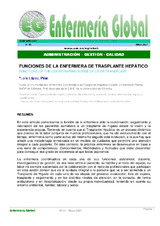Mostrar el registro sencillo del ítem
Funciones de la enfermera de trasplante hepático
| dc.contributor.author | Lora López, P. | |
| dc.date.accessioned | 2012-08-31T10:00:34Z | |
| dc.date.available | 2012-08-31T10:00:34Z | |
| dc.date.issued | 2007 | |
| dc.identifier.uri | http://hdl.handle.net/10396/7778 | |
| dc.description.abstract | En este artículo comentamos la función de la enfermera ante la coordinación, seguimiento y valoración de los pacientes sometidos a un trasplante de hígado desde la visión y la experiencia propias. Teniendo en cuenta que el Trasplante Hepático es un proceso dinámico que precisa de la labor conjunta de muchos profesionales, que ha ido evolucionando con el tiempo, enfermería como parte activa del mismo ha seguido esta evolución, a la que hay que añadir una metodología enmarcada en un modelo de cuidados que permitirá una atención integral a cada paciente. En este contexto, la práctica enfermera se desenvuelve en base a una serie de competencias: Conocimientos, Habilidades y Actitudes que debe desarrollar para conseguir ese grado de excelencia al que todos aspiramos. La enfermera coordinadora en cada una de sus funciones: asistencial, docente, investigadora y de gestión, es ese nexo entre el paciente, su familia y el resto del equipo, su labor irá siempre sustentada por la colaboración con el resto de profesionales que participan en esta acción común que es el cuidado integral a la persona que va a ser sometida a un Trasplante de Hígado en cada una de las etapas del proceso: evaluación, lista de espera, trasplante y seguimiento y en los distintos niveles de atención: en la consulta, de forma ambulatoria y en hospitalización, desde su propia individualidad, teniendo en cuenta su entorno ambiental, familiar, laboral y social. | es_ES |
| dc.description.abstract | This article deals with the functions of the nurse with regard to the coordination, follow-up and valuation of the patients who had undergone a Liver Transplant from the experiences and point of view of the author. Considering that Liver Transplant is a dynamic process which requires the combined task of many professionals and which has evolved with time, the nurse, as an active part of it, has followed this evolution and has a methodology to it, which is placed in a pattern of cares that will allow her to pay attention to each patient. In this context, nursing practice develops through a group of skills: Knowledges, Abilities and Attitudes which must be developed in order to achieve the grade of excellence that we all aspire to. The coordinating nurse at each of her functions: assistance, teaching, investigation, and management is the link between the patient, his family, and the rest of the team. Her labour will always be supported by the collaboration of the rest of the professionals who participate in this common action that is the integral care of the person who is going to undergo a Liver Transplant at each of the phases of the process: evaluation, waiting-list, transplant, and follow-up, and the different levels of attention: at the consulting room, as an out-patient and at the hospital, from his own individuality and considering environment. | es_ES |
| dc.format.mimetype | application/pdf | es_ES |
| dc.language.iso | spa | es_ES |
| dc.publisher | Universidad de Murcia | es_ES |
| dc.rights | https://creativecommons.org/licenses/by-nc-nd/4.0/ | es_ES |
| dc.source | Enfermería Global 10, 1-15 (2007) | es_ES |
| dc.subject | Enfermería | es_ES |
| dc.subject | Trasplantes hepáticos | es_ES |
| dc.title | Funciones de la enfermera de trasplante hepático | es_ES |
| dc.title.alternative | Functions of the coordinating nurse of liver transplant | es_ES |
| dc.type | info:eu-repo/semantics/article | es_ES |
| dc.rights.accessRights | info:eu-repo/semantics/openAccess | es_ES |

